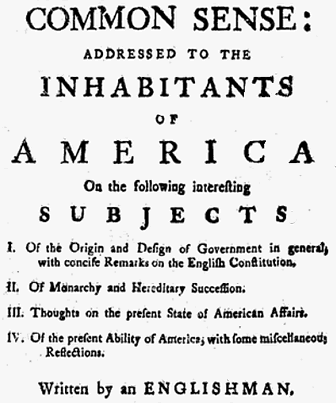I’m about to blatantly plagiarize an article from Phrases dot org that I found to be quite revealing. Actually, plagiarize is a bit strong, as I’m also posting a link to the article. The phrase’s change in meaning since our founding fathers used it illuminates the underlying reason for our current government’s
Common sense
Meaning
Good practical sense. The natural intelligence that is believed to be available to all rational people.
Origin
 Thomas Paine published a pamphlet entitled Common Sense in January 1776. It called for America to become independent of Britain and a copy of the original is considered a treasure of the US Library of Congress, being one of the wellsprings of the thinking that founded the country. Common sense, that is, a plain practical 'get on with the job' philosophy is part of the American psyche.
Thomas Paine published a pamphlet entitled Common Sense in January 1776. It called for America to become independent of Britain and a copy of the original is considered a treasure of the US Library of Congress, being one of the wellsprings of the thinking that founded the country. Common sense, that is, a plain practical 'get on with the job' philosophy is part of the American psyche.
Paine is sometimes thought to be American but in fact emigrated to the USA after living the majority of his life in the archetypally English country town of Thetford, Norfolk. Despite his radical views he considered himself English and the pamphlet's author was simply identified as "An Englishman". Nor, as is also sometimes believed, did he invent the term 'common sense', which had been in use in his native land long before Paine's day.
In the original 14th century meaning of the term, 'common sense' was a sense like our other senses. It was an internal feeling that was regarded as the common bond that united all the other human senses, the 'five wits' as they were known, and was something akin to what we now call 'heart'.
By the 16th century, the meaning had changed to be more like our present day meaning, that is, 'the plain wisdom that everyone possesses'. George Joye used the expression in Apology for William Tindale, 1535:
I am suer T[indale] is not so farre besydis his comon sencis as to saye the dead bodye hereth Cristis voyce.
[Note: 'apology' then meant 'defence against attack'/'justification of one's views', and was commonly used in the titles of scholarly disputes.]
The one thing that is usually said about common sense is that it isn't as common as it ought to be. This little gag was made as early as 1726, by the political writer Nicholas Amhurst in the satirical text The Secret History of the University of Oxford:
There is not (said a shrewd wag) a more uncommon thing in the world than common sense.
 By the time that Paine began writing in the 1770s, the term 'common sense' had migrated a little more and was widely used to mean 'primary truth', that is, the unquestionable beliefs that all people receive from their experience of being alive. Richard Price defined the term in Review of the Principal Questions in Morals, 1758:
By the time that Paine began writing in the 1770s, the term 'common sense' had migrated a little more and was widely used to mean 'primary truth', that is, the unquestionable beliefs that all people receive from their experience of being alive. Richard Price defined the term in Review of the Principal Questions in Morals, 1758:
Common sense, the faculty of self-evident truths.
Paine's work influenced many political and moral thinkers at the beginning of the American Revolution and he was personally acquainted with most of them; in England, these included the feminist Mary Wollstonecraft and the artist William Blake and in America, Benjamin Franklin, George Washington and Thomas Jefferson.
When the authors of the US Declaration of Independence began with the words "We hold these truths to be self-evident...", their meaning was 'we believe this declaration to be common sense'.
The Phrase A Week newsletter has 128,000 subscribers.
You may make a donation to support this list at www.phrases.org.uk/support.html
Like or Tweet this message via www.phrases.org.uk/meanings/common-sense.html
No comments:
Post a Comment